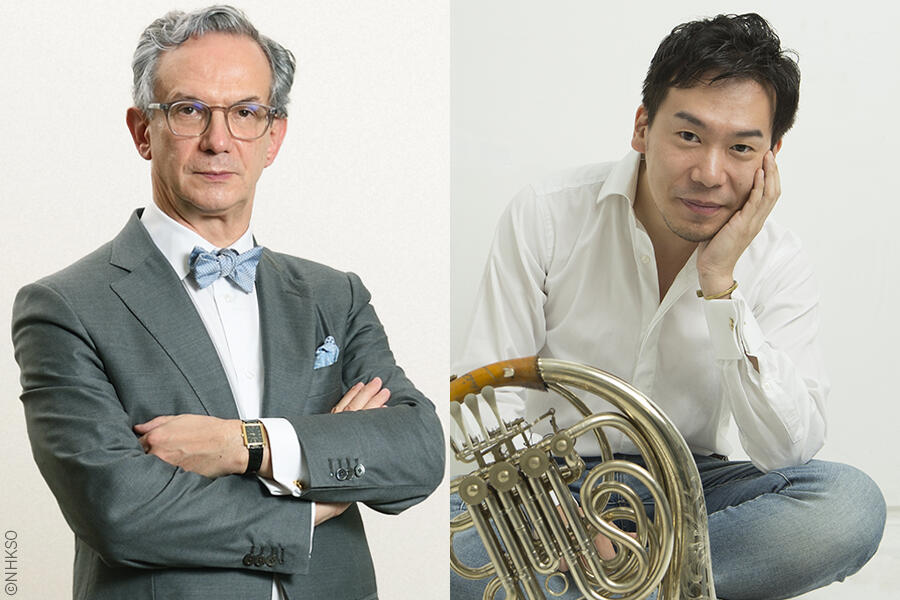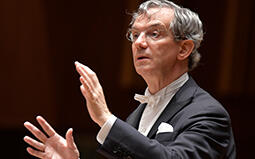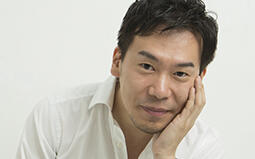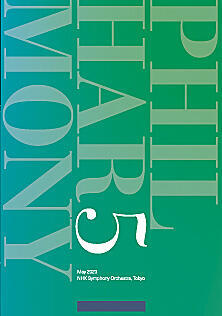- Home
- Concerts
- Subscription Concerts 2022-2023
- Program B
- No. 1985 Subscription (Program B)
No. 1985 Subscription (Program B)

Program
Haydn / Symphony No. 82 C Major Hob. I-82, The Bear
Given the deserved title "Father of Symphony" in music history today, Haydn established the Classical symphony with his over hundred works.
When accepting a commission from France in 1784, the Austrian composer, in his fifties, had been already renowned in Europe: he would complete six works called nowadays Paris Symphonies (Nos. 82-87) for Concert de la Loge Olympique, a Paris-based society having a high-grade orchestra. It became a new acoustic adventure for Haydn as the ensemble was quite a bit larger than the one of the Esterházy court, his longtime workplace. Among the Paris Symphonies, No.82 sounds particularly festive due to the use of timpani and brass instruments. It was first performed in Paris in 1787, two years before the Storming of the Bastille.
No. 82 has a fanfare-like commencement heralding immediately the first sonata theme, a simple but brilliant melody based on the C-major triad. The slow second movement contains double variations on two contrastive melodies, one is in F major and the other in F minor. The next movement is a noble minuet which must have fascinated the audience in Paris during the Old Regime. The finale starts with a low droning C note above which a light-hearted tune is presented. Some say that No. 82 was given its sobriquet, but not by the composer himself, for the opening evokes bears dancing at fairs. This tune recurs repeatedly during the coda before closing the symphony energetically.
[Kumiko Nishi]
Mozart / Horn Concerto No. 3 E-flat Major K. 447
Mozart composed at least twenty-three original piano concertos for himself to be the soloist. On the other hand, we must be grateful to a man named Joseph Leutgeb for forming a deep bond of friendship with Mozart and being an outstanding horn virtuoso. In fact, it was for him that the gifted composer wrote all his four horn concertos. Incidentally, Haydn's Horn Concerto No. 1 (1762) is said to be composed for Leutgeb, too.
Mozart penned his Horn Concerto No. 3 in around 1787, thus in the same period as his opera Don Giovanni and the above-mentioned symphony The Bear by Haydn whom he admired profoundly. As with other three concertos, Mozart intended No. 3 to be played with the natural valve-less horn, as the modern horn with valves would not be in use until the 19th century. In the days of Mozart, hornists altered pitches by vibrating their lips and pushing their hand into the bell.
From the first Allegro sonata movement, No. 3 has the horn part in close cooperation with the orchestra composed of strings, clarinets and bassoons. The middle movement is a lyrical Romance of which the horn sings the main melody at the outset. The finale, a galloping rondo, suggests a hunting scene where the horn had been originally used. Here Mozart makes us smile, reusing momentarily the main melody of the middle movement, but now at high speed.
[Kumiko Nishi]
Beethoven / Symphony No. 6 F Major Op. 68, Pastoral
The former – momentary – pupil of Haydn, Beethoven penned his Symphony No. 6 from 1807 to 1808. It was premiered in December 1808 in Vienna together with its exceedingly famous symphonic sibling No. 5 (Destiny). The two works are generally regarded as worlds apart, No. 6 being considered much more moderate in respect of style and character like his other even-numbered symphonies. However, it is in reality as epochal as No. 5 in another way, as it blazed a trail for future programmatic symphonies with the genuine Romantic spirit such as Symphonie fantastique (1830) by Berlioz and acres of symphonic (tone) poems.
Worthy of mention is that No. 6 is Beethoven's only symphony having five movements (moreover, the last three ones are performed continuously) and official programmatic contents: he called the work “Pastoral Symphony, or Recollections of Country Life” and imparted each
movement a detailed, descriptive subtitle. Nevertheless, he reminded us about his ultimate objective, emphasizing that the work is "more an expression of feeling than tone-painting." This novel stance is explicitly found in the subtitle of the literally-pastoral first movement "Awakening of cheerful feelings on arrival in the countryside." The listeners may well project this protagonist with "feelings" on Beethoven himself who loved spending time in nature. He ingeniously built this entire sonata movement with the opening melodic/rhythmic motifs heard on the first violins (A–B flat–D–C / C–B flat–A–G–C). The most realistic and picturesque is the second movement "Scene by the brook." Here, the composer even specifies which birds solo wind instruments embody during the cadenza-like moment towards the end: nightingale (flute), quail (oboe) and cuckoo (clarinets). The next merry scherzo is said to parody a-littlelazy rural bandsmen at moments. The fourth movement is scored for the largest orchestra of the whole symphony including timpani and piccolo which portray thunder and lightning respectively. The finale, or "Shepherd's song. Cheerful and grateful feelings after the storm," closes the symphony in piece giving thanks to the Creator.
[Kumiko Nishi]
Artists
 ConductorFabio Luisi
ConductorFabio Luisi
Fabio Luisi hails from Genoa. He is the Principal Conductor of the Danish National Symphony Orchestra and the Music Director of the Dallas Symphony Orchestra. In September 2022, he assumed the position of Chief Conductor of the NHK Symphony Orchestra, Tokyo.
Fabio Luisi was Principal Conductor of the Metropolitan Opera in New York, General Music Director of the Opernhaus Zürich, Principal Conductor of the Wiener Symphoniker, as well as General Music Director of the Staatskapelle Dresden and the Sächsische Staatsoper, Artistic Director and Principal Conductor of the MDR Sinfonieorchester Leipzig, and Music Director of the Orchestre de la Suisse Romande. He is Music Director of the Festival della Valle d'Itria in Martina Franca (Apulia) and has appeared as guest conductor with numerous renowned ensembles, including the Philadelphia Orchestra, the Cleveland Orchestra, the Münchener Philharmoniker, the Filarmonica della Scala, the London Symphony Orchestra, the Concertgebouworkest, and the Saito Kinen Orchestra, while also conducting operas at world's major opera houses.
Important recordings include Verdi, Bellini, Schumann, Berlioz, Rachmaninov, Rimsky- Korsakov, Frank Martin, and Franz Schmidt, the largely forgotten Austrian composer. In addition, he has recorded various symphonic poems by Richard Strauss, and a lauded reading of Bruckner's Symphony No. 9 with the Staatskapelle Dresden. His recordings of Wagner's Siegfried and Götterdämmerung with the Metropolitan Opera won Grammy awards.
 HornNobuaki Fukukawa
HornNobuaki Fukukawa
Nobuaki Fukukawa, one of the most exciting horn players of our time, appears in solo performances as well as with orchestras, in a wide variety of chamber music concerts and music festivals at home and abroad. He is at the forefront in the field of wind instruments and Riccardo Muti and Paavo Järvi have given him unstinted praise. Mozart's Horn Concertos, naturally, are his most favourite works, and he made recordings of Mozart's complete horn concertos under the baton of Masato Suzuki in February 2021.
He studied at Musashino Academia Musicae, and while still in school, performed with the Japan Philharmonic Orchestra, and eventually joined the orchestra. After assuming the position of Principal Horn, he took leave for one year in 2006 to go to Britain to study under the tutelage of David Pyatt, who was then Principal Horn of the London Symphony Orchestra. During that time, he had an opportunity to play in the orchestra. He won first prize at the 77th Japan Music Competition (horn section) in 2008, and in 2013, joined the NHK Symphony Orchestra where later he was appointed as the principal player and enjoyed much responsibility until March 2021. He held a recital at the prestigious Wigmore Hall in London in January 2019. Also being a virtuoso of natural horn and baroque horn, he has performed in concerts of the Bach Collegium Japan.
Many composers including Joe Hisaishi and Dai Fujikura have dedicated their works to him.
He is a member of Tokyo Sextet with woodwinds and piano, Councilor of the International Horn Society Advisory Council and Associate Professor of Tokyo College of Music.
[Yoshimichi Okuda, music critic]
Download
Ticket
Program B
No. 1985 Subscription (Program B)
Suntory Hall
Google Map
Seating Chart
Single Tickets Release Date
Pre-sales for Subscribers:Wednesday, March 1, 2023
*about subscribers
Sale to General Public:Sunday, March 5, 2023
Price
| S | A | B | C | D | |
|---|---|---|---|---|---|
| Ordinary Ticket | 9,800 | 8,400 | 6,700 | 5,400 | 4,400 |
| Youth Ticket | 4,500 | 4,000 | 3,300 | 2,500 | 1,800 |
Seating chart Enlarge Print PDF
*tax included
*About Youth tickets (Available at N-Kyo Guide)
*Subscribers receive a 10% discount (Available at NHKSO WEB Ticket and N-Kyo Guide)
*For wheelchair-accessible seats, please refer to the N-Kyo Guide
Starting Dates of Ticket Sales
ANNUAL SUBSCRIPTION TICKETS Mon., July 18, 2022 11:00am
[For Subscribers: Thu., July 14, 2022 11:00am]
Youth Tickets
Youth Tickets are great options for those of 25 years old and younger
WEB Select 3 Plus
Choose three or more of your favorite concerts and get a discount on single tickets
*Only available at NHKSO WEB Ticket NHKSO WEB Ticket (Accesible from Japan only)
For further information and subscription application
N-Kyo Guide TEL:0570-02-9502
Broadcast
 NHK Educational TVClassical Concert Hall
NHK Educational TVClassical Concert Hall
No. 1985 Subscription (Program B)
Sunday, Jul 16, 2023 9:00PM - 11:00PM
Program:
Haydn / Symphony No. 82 C Major Hob. I-82, The Bear
Mozart / Horn Concerto No. 3 E-flat Major K. 447
Beethoven / Symphony No. 6 F Major Op. 68, Pastoral
Conductor:Fabio Luisi
Horn:Nobuaki Fukukawa
Recorded:May 24, 2023 Suntory Hall
To watch a concert,
(accessible only from inside Japan)
(accessible only from inside Japan)


